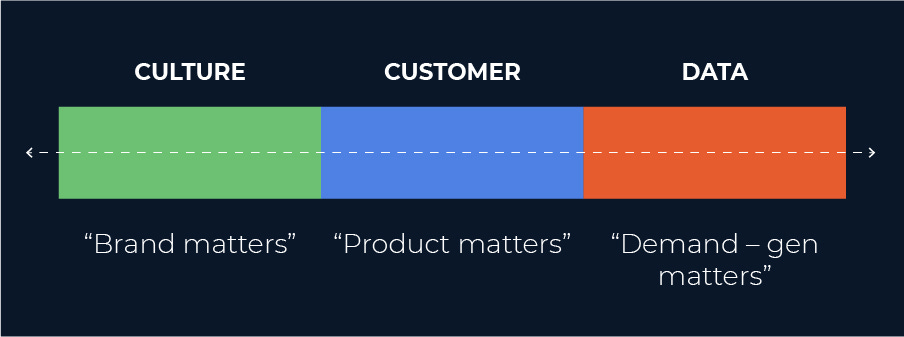Illustrations by Alejandra Céspedes.
As a crucial branch of a business, marketing appears not to have a single meaning or function. For example, suppose we look for a definition of marketing in the Cambridge Dictionary. On their site, we find that marketing is "the business activity that involves finding out what customers want, using that information to design products and services, and selling them effectively." That sounds about right, right? And yet, if we ask marketers what marketing is, there is no single definition or consensus. In the end, from what we have learned in the space over decades we think there are basically three main verticals to understand marketing; brand, product, and performance.
Twitter is crowded with those who defend and idealize brand exercises, those who think data is all that matters, and those who consistently iterate the product and turn it into gold. And, none of them are 100% correct.
The bottom line is that all three definitions and marketing modalities make a lot of sense because marketing is:
Partially a branding exercise that allows products to become symbols and carry meaning beyond function.
A data-driven probabilistic exercise that drives revenue and pushes growth.
The connection between users and products; the more a product solves users' needs, the more it will be "marketable."
And yet, it appears that if you spend more than 30 mins on Twitter or LinkedIn, you will find tons of marketers that hold their ground and believe the only way to do "proper marketing" is their way. You will come across arguments and marketers that claim they spent zero dollars on brand (which is not truly accurate because paid marketing is also brand marketing) , and many others will tell you that brand is the only way to sell.
In the end, it is almost as if marketers had forgotten the essence and meaning of marketing we mentioned above:
Finding out what customers want.
Using that information to design products and services.
Selling them effectively.
We are here to shed some light and move beyond the singular marketing approach. We do so because we firmly believe instead of defending a unique perspective, the next level of marketers understand marketing as a system that combines meaning, usability, and data.
A false dichotomy: Brand vs. Performance.
If you have been in the marketing space for a while, chances are you have moved along this spectrum.
As explained by Janessa Lantz on her Medium (thanks for the shoutout :)), hiring marketers is difficult because they seem to fall into three complementary categories that are often perceived as disconnected.
If you are a marketer, you are either an expert at:
Understanding cultural nuances.
Understanding behavior and product.
Or at data-driven performance tactics.
While this is quite true when hiring (believe us, we know it isn't easy), it can also be limiting to see it through that lense.
Deep down, we believe a fantastic marketer understands the combination of meaning, usability, and data is crucial. A good marketer probably specializes in one or two subcategories. A mediocre one probably fights all over Twitter or LinkedIn to defend the modality they think is more important.
Even though most marketers specialize in a single modality, the true beauty of marketing is understanding and executing an integrated campaign where brand, product, and performance are perfectly balanced. So balanced Thanos would be proud.
Think of a product that invests exclusively in a single modality of marketing. Indeed something will happen, and some sales will occur (as long as you have a team that knows what they are doing). And now, think about deploying a marketing strategy that orchestrates all three marketing modalities in sync.
Will the product be more successful? Will you end up diluting your focus and messing up? Will you sell more? Will you sell less?
Honestly, in a hypothetical way, it makes sense to think that the risks will decrease simply by diversifying the marketing efforts. Chances are, if you do many activities that can help your product sell more, your product will sell more than exclusively focusing on a single one.
While we understand this is not always the case, and sometimes a laser focus marketing modality works, what matters about this imaginary example is the idea that this dichotomy is false. You probably need to use all of these marketing dimensions to market your product correctly. And, even if you focus on a single one because it just works for your product, niche, and ICP, once you want to cross the chasm and attract more buyers, you may have to deploy strategies to cover all other marketing dimensions.
That is why, if you focus exclusively on a single marketing modality it may simply not be enough (your competitors may be looking at the bigger picture).
As written by Michael Lorenzos in his substack, this division between performance and brand (the ones that are more distanced in the spectrum) is "a false dichotomy because it's not supported by your audience. People buy from brands, and performance advertising is one of the marketing activities that enable a brand to reach and engage with their audience."
That makes a lot of sense. No marketer should care if one or the other (or the third modality we already mentioned) is the "right" one. What should matter is what people are actually getting out of your product (symbolically and through features), and how your organization is reaching and capturing as much information as possible to improve the overall strategy.
To put it another way, what matters is focusing on creating an internal organizational culture in which you get in front of users, and where user data is analyzed and mixed with cultural and psychological insight.
Selling and marketing are incredibly complex and unpredictable. You need a data system that informs your team on what is working and what is not, iterations to make your product memorable and dazzling, and cultural and psychological insight to become a salient, meaningful, and significant brand.
The brand vs. performance dichotomy is just a superficial discussion that conceals a much more crucial question. Instead of asking ourselves as marketers, "should I do brand or performance?" we should probably focus on the following question:
"What does my audience need to learn about my product and potentially want to buy it. And, what triggers the purchase and how do I get there?"
Or, to put it another way:
"How much trust do I need to build for my ICP to buy my product and how do I get there?"
Once we shift the tactical marketing decision-making process from a "what should I do to sell" to a "how do I develop trust and affinity," all modalities intertwine and make more sense. It is almost as if we took a step back and visualized that good marketing is about aligning socio-cultural insight across a universe of processes in relation to the audience. Not exclusively about driving revenue, or storytelling to become different, or mindless iterations with features your ICP does not value (beware of the "startup" mentality cult).
Performance allows you to track direct response, but it also allows you to become top of mind once your audience begins to look for a solution to the problems you solve. And the brand is the insightful human component that differentiates your brand and generates value beyond the product. To market effectively, you need both. (Not to mention a product that works).
"Optimally, the Brand function should sit within the Performance Marketing team and be guided by a unified measurement model. Again: there is no "opposite" approach to Performance marketing. All marketing should be informed by performance measurement."
Marketing is much more complex than going all-in in a single direction.
As marketers we need to learn to think in bets and experiment. There are no absolute answers, no playbooks, no rules, no guidelines. What we have instead as an ever changing crowded market and a consumer with infinite problems and limited attention.
Our job is to connect our product or service with that particular problem the user is looking to solve at the right price point with the least friction as possible.
Beware of Gurus, beware of magic playbooks and formulas. Instead, obsess about your user´s problems (intellectual and emotional), creating a product that solves those problems, and a performance engine that drives growth.
We created a framework to think about marketing modalities differently. Coming soon!








